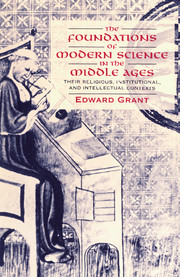 The Foundations of Modern Science in the Middle Ages
The Foundations of Modern Science in the Middle Ages Book contents
- Frontmatter
- Contents
- Preface
- 1 THE ROMAN EMPIRE AND THE FIRST SIX CENTURIES OF CHRISTIANITY
- 2 THE NEW BEGINNING: THE AGE OF TRANSLATION IN THE TWELFTH AND THIRTEENTH CENTURIES
- 3 THE MEDIEVAL UNIVERSITY
- 4 WHAT THE MIDDLE AGES INHERITED FROM ARISTOTLE
- 5 THE RECEPTION AND IMPACT OF ARISTOTELIAN LEARNING AND THE REACTION OF THE CHURCH AND ITS THEOLOGIANS
- 6 WHAT THE MIDDLE AGES DID WITH ITS ARISTOTELIAN LEGACY
- 7 MEDIEVAL NATURAL PHILOSOPHY, ARISTOTELIANS, AND ARISTOTELIANISM
- 8 HOW THE FOUNDATIONS OF EARLY MODERN SCIENCE WERE LAID IN THE MIDDLE AGES
- Notes
- Bibliography
- Index
Preface
Published online by Cambridge University Press: 05 June 2012
- Frontmatter
- Contents
- Preface
- 1 THE ROMAN EMPIRE AND THE FIRST SIX CENTURIES OF CHRISTIANITY
- 2 THE NEW BEGINNING: THE AGE OF TRANSLATION IN THE TWELFTH AND THIRTEENTH CENTURIES
- 3 THE MEDIEVAL UNIVERSITY
- 4 WHAT THE MIDDLE AGES INHERITED FROM ARISTOTLE
- 5 THE RECEPTION AND IMPACT OF ARISTOTELIAN LEARNING AND THE REACTION OF THE CHURCH AND ITS THEOLOGIANS
- 6 WHAT THE MIDDLE AGES DID WITH ITS ARISTOTELIAN LEGACY
- 7 MEDIEVAL NATURAL PHILOSOPHY, ARISTOTELIANS, AND ARISTOTELIANISM
- 8 HOW THE FOUNDATIONS OF EARLY MODERN SCIENCE WERE LAID IN THE MIDDLE AGES
- Notes
- Bibliography
- Index
Summary
Twenty-five years have passed since the publication of Physical Science in the Middle Ages in 1971 in the John Wiley History of Science Series, and nineteen years since Cambridge University Press assumed responsibility for the series in 1977. In the early 1980s, I was asked to revise the book, but other duties and responsibilities made the task unfeasible. When I finally had the opportunity a few years ago, the prospect of doing a revision no longer seemed inviting. Too much had happened in the interim. Merely expanding the old version with new material – and there has been much of it since 1971 – while retaining the earlier structure and general outlook was, frankly, unappealing. My sense of the medieval achievement in science and natural philosophy and my understanding of the intellectual environment that produced it, as well as my perception of the relationship between medieval science and the Scientific Revolution, had all been fundamentally transformed.
Between 1902 and 1916, Pierre Duhem, a famous French physicist turned historian, wrote fifteen volumes on medieval science. Duhem was the first to blow away the dust of centuries from manuscript codices that had lain untouched since the Middle Ages. What he discovered led him to make the startling claim that the Scientific Revolution, associated with the glorious names of Nicholas Copernicus, Galileo Galilei, Johannes Kepler, René Descartes, and Isaac Newton, was but an extension and elaboration of physical and cosmological ideas formulated in the fourteenth century, primarily by Parisian masters at the University of Paris.
- Type
- Chapter
- Information
- The Foundations of Modern Science in the Middle AgesTheir Religious, Institutional and Intellectual Contexts, pp. xi - xivPublisher: Cambridge University PressPrint publication year: 1996
